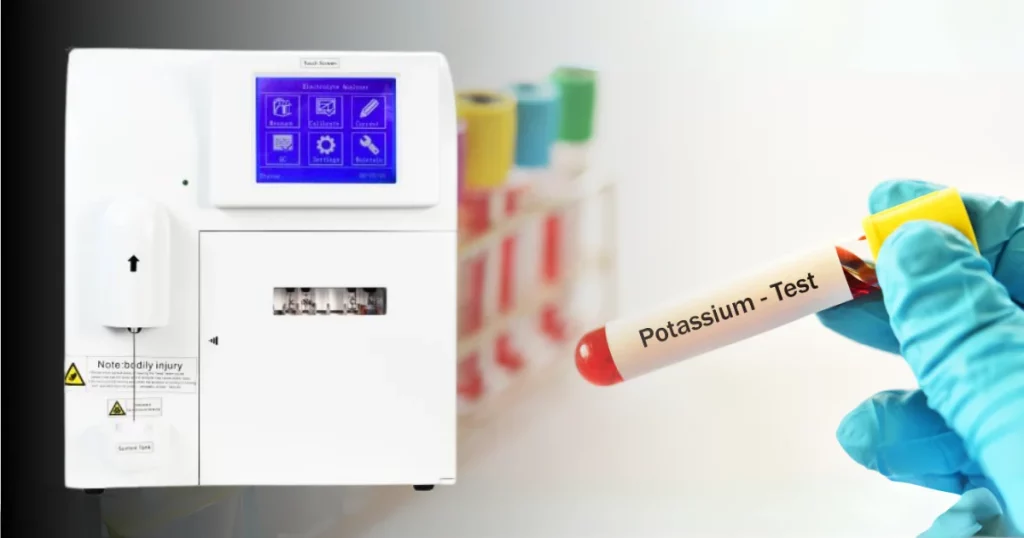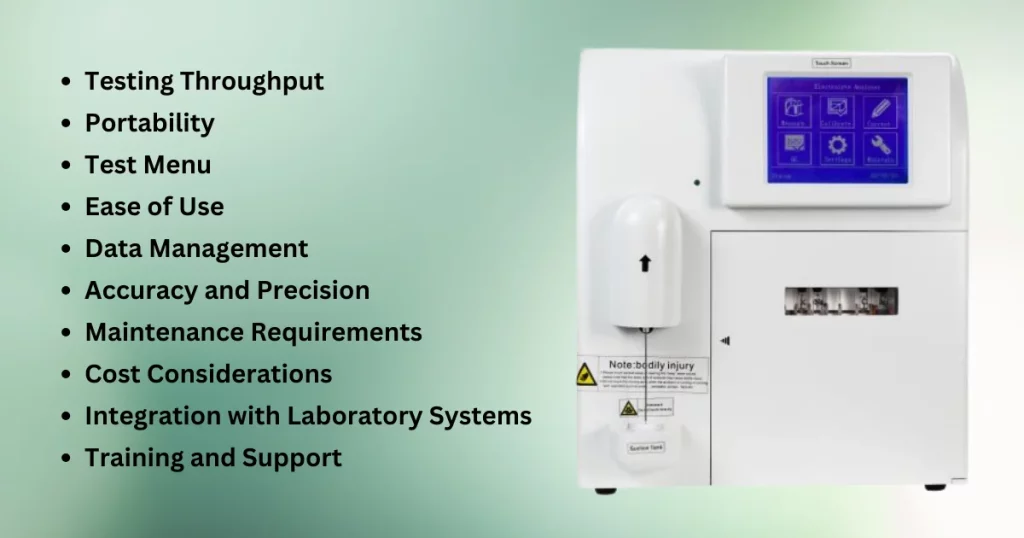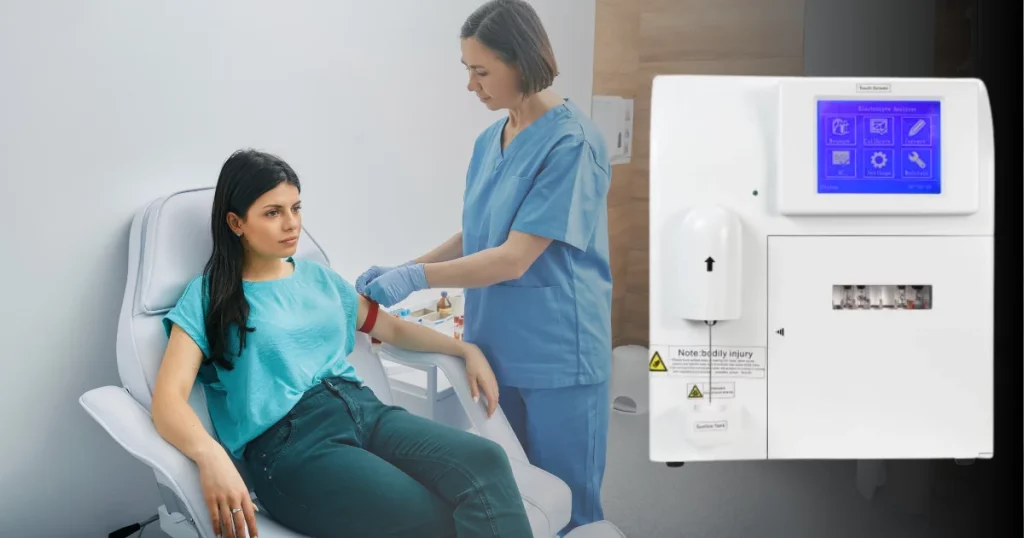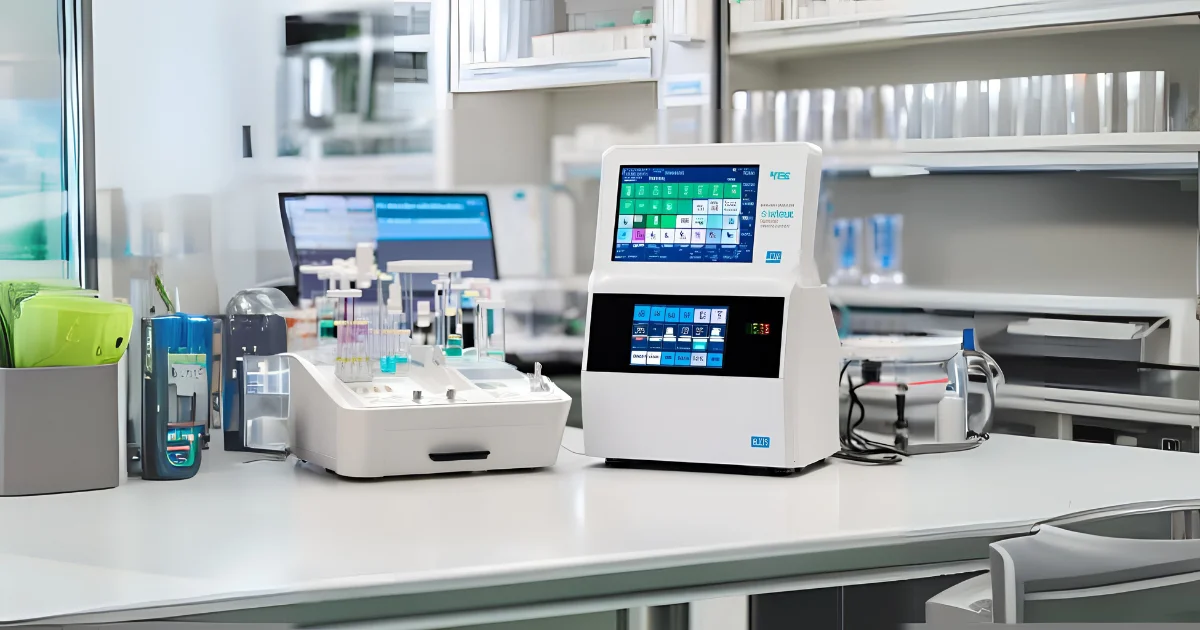Imagine a scenario where timely analysis of electrolytes could be a game-changer—whether in a hospital setting, for an athlete fine-tuning their performance, or an individual monitoring their health at home. In this comprehensive guide, we’ll explore the crucial world of electrolyte analyzers, understanding their significance, and helping you choose the best electrolyte analyzer.
Table of Contents
The Vital Role of Electrolyte Balance
Picture this: A runner pushing through the final stretch of a marathon, a patient in a hospital undergoing treatment, or an individual at home striving for optimal health. In each scenario, electrolyte balance plays a pivotal role. Electrolytes, including sodium, potassium, and chloride, are essential for various physiological functions, and maintaining their balance is critical for overall well-being.
Introducing Electrolyte Analyzers
Enter electrolyte analyzers, the unsung heroes in the quest for health optimization. From hospitals to athletic training centers and homes, these devices play a crucial role in assessing electrolyte levels. This guide aims to unravel the complexities surrounding electrolyte analyzers, assisting you in making an informed decision based on your unique requirements.
Understanding Your Needs
Embarking on the journey of selecting the best electrolyte analyzer requires a thoughtful self-assessment. Answering the following questions will guide you in making an informed decision based on your specific requirements:
1. Who Will Be Using the Analyzer?
- Healthcare Professional: Are you a healthcare professional looking for an analyzer for routine patient testing in a clinical setting?
- Athlete: Do you need the analyzer to monitor electrolyte levels for performance optimization in an athletic context?
- Individual for Home Monitoring: Are you seeking the best electrolyte analyzer for personal health, enabling electrolyte tracking at home?
2. What Is the Intended Use?
- Routine Testing: Is the purpose of the analyzer to conduct regular electrolyte analysis for patients in a healthcare setting?
- Specific Condition Monitoring: Are you looking for an analyzer for continuous monitoring of electrolyte levels associated with specific medical conditions?
- Research: Will the analyzer be utilized for in-depth analysis of electrolyte levels, particularly for research purposes?
3. What Is Your Budget?
Understanding your financial considerations is crucial in narrowing down options and selecting an analyzer that aligns with your budget.
4. What Features Are Important to You?
- Accuracy: Is precision in measuring electrolyte levels a critical feature for your needs?
- Speed: Do you require quick results, especially for time-sensitive situations?
- Portability: Is mobility important for on-the-go testing scenarios?
- Ease of Use: Are you looking for an analyzer with a user-friendly design?
- Data Management: Do you prioritize efficient storage and transfer of test results?
By addressing these questions, you’ll gain clarity on your specific requirements and preferences, enabling you to navigate the diverse landscape of the best electrolyte analyzers with confidence. Whether you’re a healthcare professional, an athlete, or an individual focused on home monitoring, understanding your needs is the first step toward making a well-informed decision.
Also read: A Comprehensive Guide to Urine Chemistry Analyzers
Exploring Different Electrolyte Analyzer Types

Electrolyte analyzers, crucial tools in medical diagnostics, are available in various types, each tailored to specific needs. Once you’ve clarified your needs, it’s time to explore the different types of electrolyte analyzers available on the market. Each type has its unique features, applications, and considerations:
1. Benchtop Analyzers
Benchtop analyzers are compact laboratory instruments for precise analysis on a work surface. They offer versatility, ease of use, and cost-effectiveness, making them suitable for smaller labs. These analyzers come in various types, including spectrophotometers and chromatographs.
Ideal for high-throughput testing in laboratory settings, offering comprehensive testing options and accurate results.
Pros:
- High-throughput for large volumes.
- Laboratory-based for comprehensive testing.
Cons:
- Less portable.
- More suitable for high-volume settings.
2. Point-of-Care (POC) Analyzers
Point-of-care (POC) analyzers are portable diagnostic tools for on-the-spot testing in non-laboratory settings. They offer quick results, facilitating immediate medical decisions at the point of patient care, and enhancing healthcare efficiency. POC analyzers cover diverse applications, including blood glucose monitoring and infectious disease testing.
Portable and convenient for near-patient testing, providing rapid results in various healthcare settings.
Pros:
- Portable for near-patient testing.
- Provides quick results.
Cons:
- May have a more limited scope of tests.
- Ideal for smaller volumes.
3. Automated Analyzers
Automated analyzers are high-tech lab instruments that conduct tests with minimal human involvement. They streamline processes, ensuring efficiency and precision in clinical diagnostics and other analytical tasks. These systems contribute to increased throughput and reduced errors in laboratory workflows.
Efficient and suitable for high-volume testing with minimal user intervention, ensuring consistent and reliable results.
Pros:
- High efficiency with minimal user intervention.
- Best for high-volume testing.
Cons:
- May come with a higher initial cost.
- Limited mobility.
4. Manual Analyzers
Manual analyzers are traditional lab instruments, relying on human intervention for tests and analyses. They offer flexibility and are suitable for specific settings where a hands-on approach is preferred. While lacking automation, manual analyzers can be cost-effective for particular laboratory needs.
Cost-effective options that may require more user expertise, suitable for low-volume settings or specific research needs.
Pros:
- Less expensive.
- Requires more user expertise.
Cons:
- More labor-intensive.
- Suitable for low-volume settings.
Pros and Cons Analysis
Choosing the right type depends on various factors, such as your testing volume, mobility requirements, and budget constraints. Each type has its unique advantages and limitations, and the key is aligning these with your specific needs.
Key Features to Choose the Best Electrolyte Analyzer

Selecting the best electrolyte analyzer involves evaluating several key features to ensure it aligns with your specific needs and preferences:
- Testing Throughput: Consider the volume of tests you need to perform. Benchtop analyzers are suitable for high volumes, while point-of-care analyzers are more portable for smaller testing needs.
- Portability: Determine if portability is a priority. Point-of-care and portable analyzers are ideal for on-the-go testing, offering flexibility in various healthcare settings.
- Test Menu: Assess the analyzer’s test menu to ensure it covers the electrolytes relevant to your testing requirements. Different analyzers may have varying capabilities.
- Ease of Use: User-friendly design is crucial for efficient operation. Consider analyzers with intuitive interfaces and straightforward procedures, especially for point-of-care testing.
- Data Management: Efficient storage and transfer of test results are essential. Choose the best electrolyte analyzer with robust data management features, including storage capacity and connectivity options.
- Accuracy and Precision: Evaluate the accuracy and precision of the analyzer, as these factors are critical for reliable test results. Automated analyzers often provide high accuracy with minimal user intervention.
- Maintenance Requirements: Consider the maintenance needs of the analyzer. Some analyzers may require more frequent maintenance, while others offer automated systems for minimal user intervention.
- Cost Considerations: Assess the initial cost and ongoing operational costs of the analyzer. Balance your budget constraints with the features and capabilities required for your testing needs.
- Integration with Laboratory Systems: For benchtop analyzers, compatibility with existing laboratory systems is vital. Ensure seamless integration for efficient workflow and data management.
- Training and Support: Consider the availability of training and customer support. Analyzers with comprehensive training programs and reliable customer support can contribute to successful implementation.
By carefully considering these key features, you can make an informed decision when choosing the best electrolyte analyzer to meet your specific diagnostic and testing requirements.
Additional Considerations
In addition to the key features outlined earlier, several other factors warrant consideration to make an informed decision when selecting the best electrolyte analyzer:
Sample Handling and Storage Requirements
Familiarize yourself with the sample handling and storage procedures associated with the analyzer. Ensure that these procedures align with your laboratory or testing facility’s workflow to maintain the integrity of samples and facilitate reliable testing processes.
Brand Reputation and Customer Support
Choose the best electrolyte analyzer from a reputable brand with a positive industry standing. A reliable brand often indicates product quality and performance. Additionally, assess the availability and effectiveness of customer support services, as this can significantly contribute to a positive user experience and aid in troubleshooting if needed.
Reading and Interpreting Results
Evaluate the resources provided for reading and interpreting analyzer results. Access to comprehensive training materials and educational resources is crucial for users to develop a thorough understanding of the results. This contributes to user competence and ensures responsible and accurate interpretation of test outcomes.
By taking these additional considerations into account, you can further refine your decision-making process and select an electrolyte analyzer that not only meets your technical requirements but also aligns with your operational preferences and support needs.
Conclusion
In conclusion, choosing the best electrolyte analyzer is a nuanced process that requires careful consideration of your specific needs and priorities. By understanding the different types of analyzers, evaluating key features, and considering additional factors, you can make an informed decision that aligns with your goals.
Key Steps and Considerations
Summarize the key steps and considerations for choosing the right electrolyte analyzer:
1. Assess Your Needs: Clearly define your intended use, budget, and features that are important to you.
2. Explore Analyzer Types: Understand the characteristics of benchtop, point-of-care, automated, and manual analyzers.
3. Evaluate Key Features: Consider measuring range, accuracy, speed of results, ease of use, data management, portability, and cost.
4. Additional Considerations: Take into account regulations, sample handling, brand reputation, and resources for result interpretation.
Research and Consultation
As you embark on the journey of choosing the best electrolyte analyzer, thorough research and, if needed, consultation with experts will be invaluable. The right choice can make a significant impact on patient care, athletic performance, or personal health monitoring.
Disclaimer
It’s crucial to emphasize that while this guide offers valuable insights, consulting with a healthcare professional is indispensable for personalized medical advice. Analyzer results should be interpreted responsibly under the guidance of qualified healthcare professionals.
FAQ’s
1. What is the significance of electrolyte balance in various scenarios, such as marathon running, hospital treatment, and personal health monitoring?
Answer: Electrolyte balance is crucial in physiological functions, supporting scenarios like energy optimization in marathon running, aiding treatment in hospitals, and ensuring overall well-being during personal health monitoring.
2. How do electrolyte analyzers contribute to health optimization in different settings, including hospitals, athletic training centers, and homes?
Answer: Electrolyte analyzers play a vital role by assessing electrolyte levels, providing insights for health optimization in hospitals, aiding performance enhancement in athletic settings, and enabling convenient monitoring at home.
3. What are the key considerations when determining who will be using the electrolyte analyzer, whether it’s a healthcare professional, athlete, or an individual for home monitoring?
Answer: Considerations include the specific needs of healthcare professionals for routine patient testing, athletes for performance optimization, and individuals at home for personal health monitoring.
4. How does the intended use of the electrolyte analyzer, such as routine testing, specific condition monitoring, or research purposes, impact the selection process?
Answer: The intended use influences the choice, with routine testing requiring efficiency, specific condition monitoring needing precision, and research purposes necessitating in-depth analysis.
5. What role does budget play in choosing the right electrolyte analyzer, and how can financial considerations be balanced with specific needs?
Answer: Budget is crucial; balancing financial constraints involves aligning specific needs with available options, ensuring the chosen analyzer meets requirements without exceeding budgetary limits.
6. Which features, such as accuracy, speed, portability, ease of use, and data management, should be prioritized based on individual requirements when selecting an electrolyte analyzer?
Answer: Prioritize features based on individual needs – accuracy for reliable results, speed for time-sensitive situations, portability for mobility, ease of use for efficient operation, and robust data management for result storage and transfer.
7. What are the pros and cons of different types of electrolyte analyzers, including benchtop, point-of-care, automated, and manual analyzers?
Answer: Pros and cons vary; benchtop offers high throughput but is less portable, point-of-care is portable but may have a limited scope, automated ensures efficiency but comes with higher initial costs, and manual is cost-effective but more labor-intensive.
8. How should one evaluate testing throughput, portability, test menu, and other key features when deciding on the most suitable electrolyte analyzer?
Answer: Evaluate based on testing volume, need for portability, relevance of the test menu, and other features aligned with specific requirements to choose the best electrolyte analyzer.
9. In addition to key features, what other factors like sample handling, brand reputation, and customer support should be considered for making an informed decision?
Answer: Consider sample handling aligning with workflow, choose a reputable brand for quality, and assess the effectiveness of customer support for a positive user experience and troubleshooting.
10. What are the essential steps and considerations summarized for choosing the right electrolyte analyzer, and how can research and consultation with experts enhance the decision-making process?
Answer: Summarized steps include assessing needs, exploring analyzer types, evaluating key features, considering additional factors, and emphasizing thorough research and expert consultation for an informed decision.




